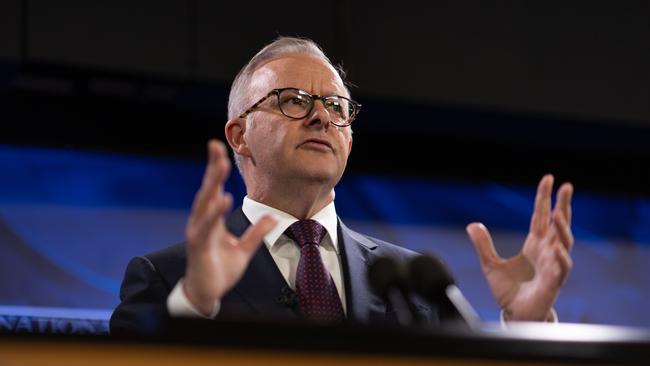Australians ambivalent about a Future Made in Australia
Australians are ambivalent about the Albanese government’s flagship Future Made in Australia plan, with many believing taxpayer-funded investments should be funnelled into other economic areas.

Australians are ambivalent about the Albanese government’s flagship Future Made in Australia plan, with many believing taxpayer-funded investments should be funnelled into other economic areas including food, agriculture, medicines and pharmaceuticals as well as medical devices.
A special release of the JWS Research True Issues survey focusing on Labor’s Made in Australia agenda has revealed that overall national support for the government’s program sits at 49 per cent, with men (54 per cent) being more supportive than women (43 per cent).
Outright rejection of the policy vision is relatively low at 14 per cent opposed, while 37 per cent don’t know about the policy or have no positive or negative views.
However, the survey of 1000 respondents found that some key planks of the Made in Australia plan were not connecting with the public, including the $1bn investment into a US-based company to develop a world first quantum computer in Brisbane.
Only 42 per cent of those surveyed were supportive of taxpayer investment for quantum computing. Critical mineral exploration, extraction and processing did receive majority support at 60 per cent. But given the strong focus on this being the part of the Made in Australia agenda aimed at backing Western Australia and Queensland, taxpayer-funded investment in critical minerals did not receive notably higher backing in these resource states at 64 per cent and 62 per cent respectively.
The survey identified other key sectors where there would be strong support for greater taxpayer-funded investments: manufacturing medical devices (74 per cent) and medicines and pharmaceuticals (73 per cent) garnered the most support.
This was followed by energy-efficient building materials (72 per cent) and food processing and more efficient agriculture (70 per cent).
The survey found there was only a five-point stronger response from those in country Australia (73 per cent) compared to metropolitan residents (68 per cent) – meaning support for food industries was high across the nation.
The survey found that investment in food industries was “also very popular (81 per cent support) in Tasmania/NT/ACT, where there are a handful of key seats expected to be hotly contested at the next federal election.”
Amid a polarising debate over energy policy, the JWS Research has revealed taxpayer-funded support for investment in wind-turbines is running at 55 per cent overall, 62 per cent for solar panels and 41 per cent for nuclear.
This represents a challenge for the Peter Dutton-led opposition which will shortly unveil its own nuclear energy policy.
While overall support for taxpayer-funded investment for nuclear energy is running at 41 per cent, with 27 per cent opposed, the survey states that the task for nuclear energy proponents is to win over a big chunk of those in the neutral column (25 per cent) and those who are unsure (7 per cent).
“The LNP may be encouraged that 60 per cent of their likely voters support nuclear power-focused industry policy, but it’s a big gap to those leaning towards other parties,” the survey concludes. “From Labor, Greens through the minor parties and independents, the drop-off in support for nuclear ranges from 20 to 30 points less, with opposition (40 per cent) outweighing support (28 per cent) among Greens voters.”
Government investment in industries like robotics (49 per cent), satellites and space based communications (42 per cent) and space based science and research (37 per cent) were also all below majority support among the 13 different modern manufacturing and research-based industries tested.
In March, Anthony Albanese unveiled a $1bn investment in the Solar Sunshot program aimed at ensuring Australia captured more of the global solar manufacturing supply chain including through production subsidies and grants.
But the decision ignited criticism, including by the head of the Productivity Commission, Danielle Wood, who warned it was unwise to divert investment from more productive parts of the economy.




To join the conversation, please log in. Don't have an account? Register
Join the conversation, you are commenting as Logout